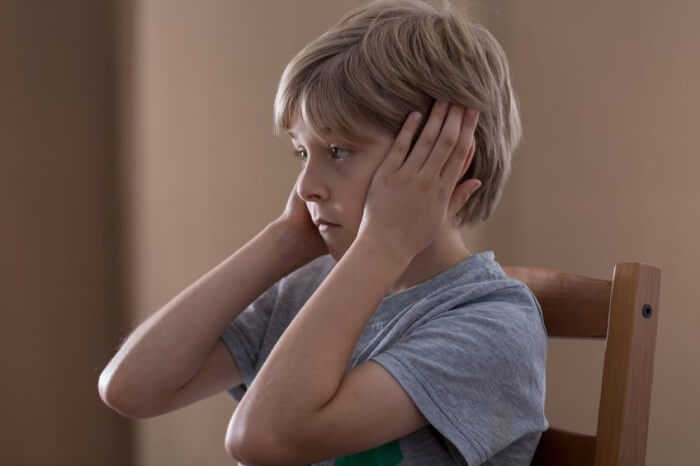The Endless Solitude of Children Today

In the last decade we’ve seen a growing tendency nearly all over the world: the “adultization” of children. We can see parents who sit next to their baby’s crib and talk to him or her about the importance of crying at certain times and not others. “They have to start learning when they’re young,” they say.
From the start, they try to educate these children for something that seems like a sort of autonomy at any cost. They want their children to interrupt their lives as little as possible: to learn to get up and go to bed by themselves, to finish their schoolwork without anyone having to supervise them, to wait “quietly” at home for their parents until they get home from work. In other words: for them to behave like little adults.
“Childhood has its own way of seeing, thinking, and feeling, and nothing is more foolish than to try to substitute ours for theirs”
–Jean Jacques Rousseau–
This attitude creates a certain feeling of guilt in parents. The bad thing is that they try to weaken this guilt with expensive gifts or extreme care in certain areas of their lives. This may be calling them every two hours “to see how things are going.” Or they take advantage of their vacation time to go to the other end of the world with them, supposedly to make up for some of their absence.
Worn-out parents and unsatisfied children
Children’s solitude is a true epidemic. This is spread by the climate these days where it seems that the time to hug, kiss, and have a relaxed conversation no longer exists. Instead of this, there is only time for work: worn-out people and long faces. Parents who come home late and are always tired and irritable.

UNICEF did a survey about what quality of life means for children, and they were able to prove that their focus is very different from that of adults. Children around the world, between the ages of 8 and 14, gave a list of what they consider to be “living well.” They do not include expensive toys, nor outlandish gifts, but rather, a list of very simple things:
- For their parents to yell less and to talk more
- For their parents’ cell phones to be shut off
- For their parents to hug them more
- For them to spend less time locked up in schools and more time doing physical activities with their parents
- For people to smile more
- For them not to have to move
Children have become silent and sad
Now it is more common than ever to see children with sad or distant expressions. Children today feel very alone and that is turning them into silent people. They do not know how to express what they feel because this is never a subject of conversation. And not knowing how to describe their internal world increases their solitude.
They are also more irritable, intolerant, and demanding. They also cannot organize their emotions in a coherent fashion. For many of them, it is difficult to be spontaneous and they are extremely vulnerable to the opinions of others.

Imposed solitude is never good because it drowns the person suffering from it in a sort of emotional limbo, especially if this is a child. They feel like they have nowhere to turn, no ground under their feet. They experience fear and that is why they can develop a defensive and phobic personality, which will only bring them great difficulties in their adult lives when it comes to having healthy relationships with others.
What to do when faced with children’s immense solitude?
Surely many parents have at some point noticed that their children are very lonely. But they feel like they are faced with a serious dilemma: either they work to economically support their home or they go without to be together with their children. However, something, or really a lot, can be done about this. These are some of the possible courses of action:
- It is important to try to negotiate some kind of flexibility in your work schedule in order to care for your children. This could be as little as an hour a week that you then dedicate to them.
- Agreeing with your partner, or with other adults, how to distribute time so that the children spend as little time as possible without a reliable adult at their side. This is for the time when they are not at school.
- Setting aside time that will be dedicated exclusively to the children. If you dedicate at least 30 minutes a day, with your cell phone off and not thinking about anything else, just hugging your child, telling them about the big things that happened in your day, and asking them about theirs, you will already be making a great contribution to their happiness. If you cannot dedicate at least 30 minutes, then aim for 15 minutes each day.
- Play with your children at least once a week. That time is very precious: it goes by quickly and when it is gone, it doesn’t come back. If you play with them, you do not need to tell them that you love them: they know it and they will feel like they are valued.

Whatever the conditions are, it is worth thinking about how to dedicate more time to your children. They deserve it. They are in a stage of their lives where every experience leaves its mark. Maybe this will involve some sort of sacrifice, but we can say with complete certainty that it is worth it.
Remember that there are things that are very important to them!
Images courtesy of Tankieka Kast, Anne Byrme
In the last decade we’ve seen a growing tendency nearly all over the world: the “adultization” of children. We can see parents who sit next to their baby’s crib and talk to him or her about the importance of crying at certain times and not others. “They have to start learning when they’re young,” they say.
From the start, they try to educate these children for something that seems like a sort of autonomy at any cost. They want their children to interrupt their lives as little as possible: to learn to get up and go to bed by themselves, to finish their schoolwork without anyone having to supervise them, to wait “quietly” at home for their parents until they get home from work. In other words: for them to behave like little adults.
“Childhood has its own way of seeing, thinking, and feeling, and nothing is more foolish than to try to substitute ours for theirs”
–Jean Jacques Rousseau–
This attitude creates a certain feeling of guilt in parents. The bad thing is that they try to weaken this guilt with expensive gifts or extreme care in certain areas of their lives. This may be calling them every two hours “to see how things are going.” Or they take advantage of their vacation time to go to the other end of the world with them, supposedly to make up for some of their absence.
Worn-out parents and unsatisfied children
Children’s solitude is a true epidemic. This is spread by the climate these days where it seems that the time to hug, kiss, and have a relaxed conversation no longer exists. Instead of this, there is only time for work: worn-out people and long faces. Parents who come home late and are always tired and irritable.

UNICEF did a survey about what quality of life means for children, and they were able to prove that their focus is very different from that of adults. Children around the world, between the ages of 8 and 14, gave a list of what they consider to be “living well.” They do not include expensive toys, nor outlandish gifts, but rather, a list of very simple things:
- For their parents to yell less and to talk more
- For their parents’ cell phones to be shut off
- For their parents to hug them more
- For them to spend less time locked up in schools and more time doing physical activities with their parents
- For people to smile more
- For them not to have to move
Children have become silent and sad
Now it is more common than ever to see children with sad or distant expressions. Children today feel very alone and that is turning them into silent people. They do not know how to express what they feel because this is never a subject of conversation. And not knowing how to describe their internal world increases their solitude.
They are also more irritable, intolerant, and demanding. They also cannot organize their emotions in a coherent fashion. For many of them, it is difficult to be spontaneous and they are extremely vulnerable to the opinions of others.

Imposed solitude is never good because it drowns the person suffering from it in a sort of emotional limbo, especially if this is a child. They feel like they have nowhere to turn, no ground under their feet. They experience fear and that is why they can develop a defensive and phobic personality, which will only bring them great difficulties in their adult lives when it comes to having healthy relationships with others.
What to do when faced with children’s immense solitude?
Surely many parents have at some point noticed that their children are very lonely. But they feel like they are faced with a serious dilemma: either they work to economically support their home or they go without to be together with their children. However, something, or really a lot, can be done about this. These are some of the possible courses of action:
- It is important to try to negotiate some kind of flexibility in your work schedule in order to care for your children. This could be as little as an hour a week that you then dedicate to them.
- Agreeing with your partner, or with other adults, how to distribute time so that the children spend as little time as possible without a reliable adult at their side. This is for the time when they are not at school.
- Setting aside time that will be dedicated exclusively to the children. If you dedicate at least 30 minutes a day, with your cell phone off and not thinking about anything else, just hugging your child, telling them about the big things that happened in your day, and asking them about theirs, you will already be making a great contribution to their happiness. If you cannot dedicate at least 30 minutes, then aim for 15 minutes each day.
- Play with your children at least once a week. That time is very precious: it goes by quickly and when it is gone, it doesn’t come back. If you play with them, you do not need to tell them that you love them: they know it and they will feel like they are valued.

Whatever the conditions are, it is worth thinking about how to dedicate more time to your children. They deserve it. They are in a stage of their lives where every experience leaves its mark. Maybe this will involve some sort of sacrifice, but we can say with complete certainty that it is worth it.
Remember that there are things that are very important to them!
Images courtesy of Tankieka Kast, Anne Byrme
This text is provided for informational purposes only and does not replace consultation with a professional. If in doubt, consult your specialist.







